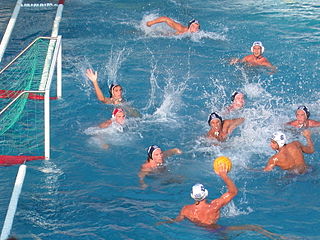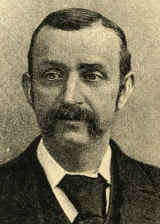Related Research Articles

Water polo is a competitive team sport played in water between two teams of seven players each. The game consists of four quarters in which the teams attempt to score goals by throwing the ball into the opposing team's goal. The team with the most goals at the end of the game wins the match. Each team is made up of six field players and one goalkeeper. Excluding the goalkeeper, players participate in both offensive and defensive roles. It is typically played in an all-deep pool where players cannot touch the bottom.

Tag is a playground game involving one or more players chasing other players in an attempt to "tag" and mark them out of play, usually by touching with a hand. There are many variations; most forms have no teams, scores, or equipment. Usually, when a person is tagged, the tagger says, "Tag, you're 'It'!". The last one tagged during tag is "It" for the next round. The game is known by other names in various parts of the world, including "running and catching" in India and "catch and cook" in the Middle East.
Marco Polo is a form of tag played in a swimming pool.

Ponds Forge International Sports Centre is a leisure complex in Sheffield, England. It has an Olympic-sized swimming pool with 2,600 seating capacity, a family and children's pools, water slides amongst other facilities.
What's the time, Mr. Wolf? is a form of tag played in Australia, Belgium, Canada, the United States, the English-speaking Caribbean, Ireland, New Zealand, South Africa, and the United Kingdom.

British Bulldog is a tag-based playground and sporting game, commonly played in schoolyards and on athletic fields in the UK, Canada, South Africa, Australia, and related Commonwealth countries, as well as in the U.S. and Ireland. The object of the game is for one player to attempt to intercept other players who are obliged to run from one designated area to another. British Bulldog is characterised by its physicality and is often regarded as violent, leading it to be banned from many schools due to injuries to the participants.

Underwater football is a two-team underwater sport that shares common elements with underwater hockey and underwater rugby. As with both of those games, it is played in a swimming pool with snorkeling equipment.
The following terms are used in water polo. Rules below reflect the latest FINA Water Polo Rules.
The history of water polo as a team sport began in mid 19th-century England and Scotland, where water sports were a feature of county fairs and festivals.
The "Blood in the Water" match was a water polo match between Hungary and the USSR at the 1956 Melbourne Olympics. The match took place on 6 December 1956 against the background of the 1956 Hungarian Revolution, and saw Hungary defeat the USSR 4–0. The name was coined after Hungarian player Ervin Zádor emerged during the last two minutes with blood pouring from above his eye after being punched by Soviet player Valentin Prokopov.
Traditional Filipino games or indigenous games in the Philippines are games that have been played across multiple generations, usually using native materials or instruments. In the Philippines, due to limited resources for toys, children usually invent games without needing anything but players.There are different kinds of Philippine Traditional Games that are suited for kids, and the games also stand as one of the different culture and/or traditional games of the Philippines. These games are not only fun to play, but these games are also good for you. This is because different games require different skills. These games are also an important part in Filipino culture.
James Alan Gaughran was an American water polo player, competitive swimmer, and former Hall of Fame Stanford Head Swimming and Water Polo Coach from 1960–73. Gaughran competed in Water Polo for the U.S. in the 1956 Summer Olympics in Melbourne.

Blind man's buff or blind man's bluff is a variant of tag in which the player who is "It" is blindfolded. The traditional name of the game is "blind man's buff", where the word buff is used in its older sense of a small push.

Nicola Maree Zagame nicknamed Ziggy and Nicky, is an Australian water polo centre back/driver. She has represented her country as a member of Australia women's national water polo team on both the junior and senior levels, and was part of the silver winning team at the 2010 FINA Women's Water Polo World Cup. She represented Australia at the 2012 Summer Olympics and the 2016 Summer Olympics, winning a bronze medal at the 2012 Olympics.

In water polo, the goalkeeper occupies a position as the last line of defense between the opponent's offence and their own team's goal, which is 2.8 m2 (30 sq ft).
The West London Penguin Swimming and Water Polo Club, also known as the West London Penguins, is a British water polo and masters swimming club with history dating back to 1916. It was formed in 1976 as the Hammersmith Penguin Swimming Club by the merger of the Hammersmith Ladies Swimming Club and Penguin Swimming Club (1921). It states its date of foundation as 1921.

The rules of water polo are the rules and regulations which cover the play, procedure, equipment and officiating of water polo. These rules are similar throughout the world, although slight variations do occur regionally and depending on the governing body. Governing bodies of water polo include FINA, the international governing organization for the rules; the NCAA, which govern the rules for collegiate matches in the United States; the NFHS, which govern the rules in high schools in the USA; and the IOC, which govern the rules at Olympic events.

Ashleigh Elizabeth Johnson is an American water polo player considered by many to be the best goalkeeper in the world. She was part of the American team that won the gold medal at the 2015 World Aquatics Championships. In 2016, she became the first African-American woman to make the US Olympic team in water polo. She was part of the gold-medal winning 2016 and 2020 U.S. women's water polo Olympic teams.
References
- ↑ Bittarello, Maria Beatrice (2009). "Marco Polo". In Rodney P. Carlisle (ed.). Encyclopedia of Play in Today's Society. SAGE. ISBN 1-4129-6670-1.
- ↑ "10 Classic Swimming Pool Games". How Stuff Works. Retrieved 25 June 2019.